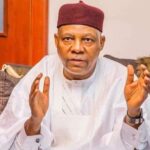Two months before the inauguration of the 10th National Assembly in June, the contest for its leadership positions has become crowded with contenders and pretenders, all advancing different reasons the coveted Senate presidency and the House speaker’s seat should be zoned or thrown open. While those scheming for the plum jobs in the federal parliament have commenced intense lobbying and politicking, two issues have dominated debates on the race: religious sentiment and requisite legislative experience.
Analysts continue to argue that cognitive legislative experience should be a prerequisite for choosing presiding officers in the parliament.
However, proponents of religious balancing in the composition of the 10th National Assembly leadership argued that it will only be fair and just if the ruling All Progressives Congress (APC) consider a southern Christian for Senate presidency since both the president-elect, Asiwaju Bola Ahmed Tinubu and his vice Kashim Shettima are of the same Islamic faith. They backed up their arguments with the controversy that trailed the party’s Muslim-Muslim presidential ticket, which partly shaped the February 25 presidential poll, and the need for the APC’s leadership to avoid the same furore in choosing the number three citizen.
Be that as it may, it is worthy of note to highlight the principle of separation of powers in a democracy like ours.
10th N’Assembly: The imperative of balancing the scales
Healing Nigeria: A clarion call from an elder statesman
The legislature is an independent arm of government and has always been run devoid of religious sentiments. The region or religious affiliation of the leadership of the executive arm has no determining factor in the leadership configuration of the legislature and judiciary.
In democracies the world over, seniority, competence, and cognitive legislative experience (not religious/ethnic factors), are widely used in parliamentary systems where the most experienced legislators are given priority in leadership positions.
This has also been the practice in the Nigerian federal legislature for years. In the First Republic, Nnamdi Azikiwe and Jaja Wachukwu, both from the South East and Christians, served as the Senate President and the Speaker of the House of Representatives respectively.
Dr Joseph Wayas was the Senate President in the Second Republic while John Wash Pam, another Christian from Plateau State was Deputy Senate President. The House of Representatives had Chief Edwin Umezeoke and later Chaha Biam as Speakers. Nigeria also had Dr Iyorchia Ayu as Senate President, and Agunwa Anaekwe as Speaker, all Christians.
In the fourth republic, the country, at a time, also had David Mark as Senate President; Ike Ekweremadu as deputy, and Patricia Etteh as House Speaker, all of them Christians. There were the most experienced and ranking at that time. Competence was not sacrificed on the altar of religious or ethnic sentiment.
This establishes the fact that religion has never shaped the leadership composition of the parliament. The 10th National Assembly should not be any different.
The years of legislative experience and competence of those scheming for the leadership of the parliament should not be jettisoned for differences in faith.
It is pertinent for APC leadership to note that considering North West for the Senate presidency will further boost the party’s chances to regain its stronghold of Kano and other northwestern states, which it has lost to the opposition.
Sani Kanba writes from Abuja
 Join Daily Trust WhatsApp Community For Quick Access To News and Happenings Around You.
Join Daily Trust WhatsApp Community For Quick Access To News and Happenings Around You.

